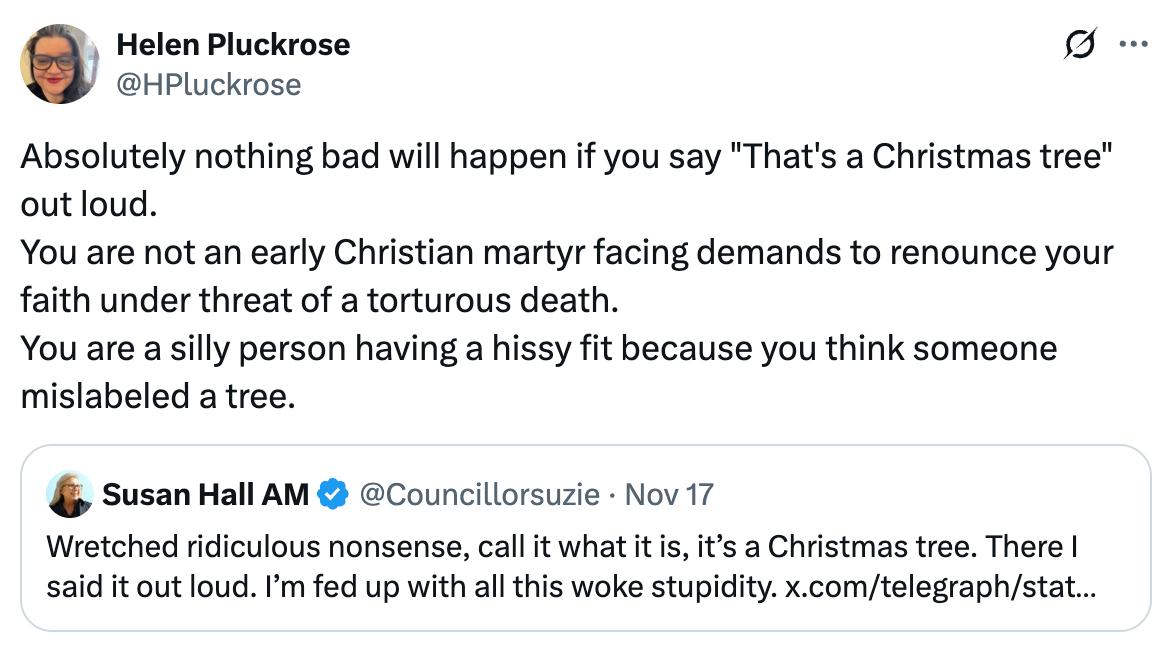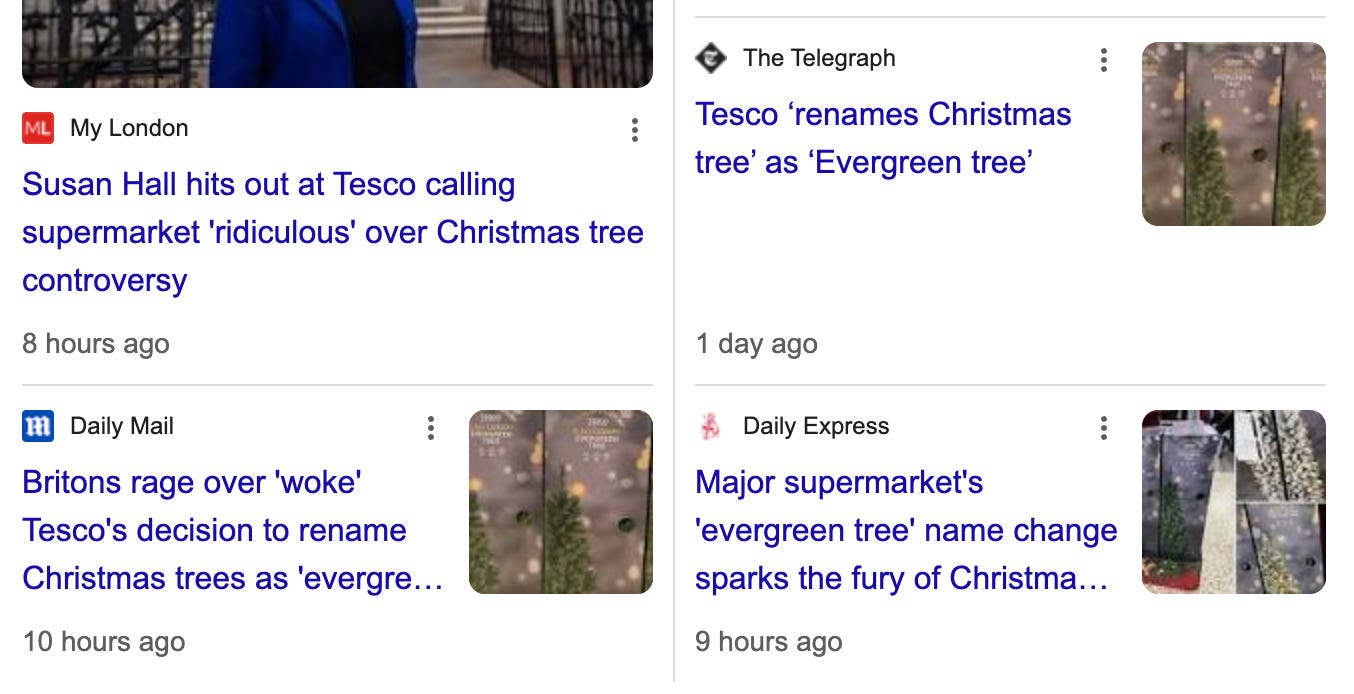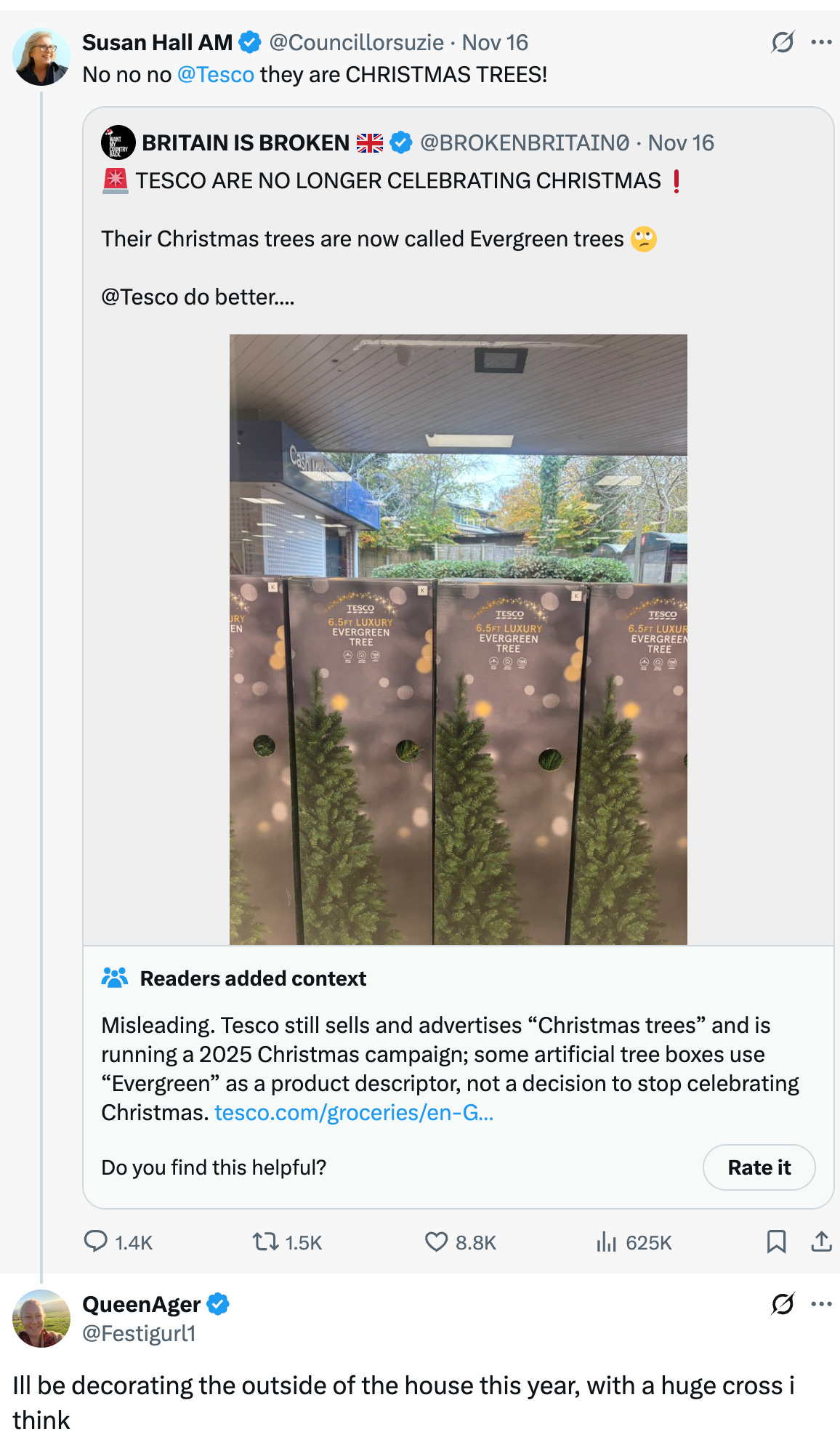Nobody Has Stolen Christmas
Get a Grip
(Audio version here)
Tesco has labelled one of its many Christmas trees an “Evergreen,” seemingly to differentiate what design of tree it is from all the other Christmas trees. Subsequently, parts of the British right lost their collective minds. They insisted that the supermarket chain is part of a large cultural movement to undermine our culture, disrespect our predominant religion, prioritise the feelings of people of minority religions over the majority and pander to the ‘woke.’ A few days after the supermarket was highly praised for its Christmas advert “That’s What Makes It Christmas” we are hearing that, “Tesco has stolen Christmas.”
In reality, Tesco’s Christmas range is enormous, loudly and repeatedly labelled “Christmas”, stuffed with Christmas music, Christmas jumpers, Christmas puddings, and Christmas trees quite happily labelled Christmas trees. Tesco informed the Express:
We are proudly celebrating Christmas at Tesco and have a range of real and artificial Christmas trees in store as part of a wide selection of Christmas products to help our customers celebrate Christmas this year. This product is described as an ‘evergreen tree’ to make it clear which type of Christmas tree is inside the box and help customers to distinguish between the many Christmas Trees in the range. Elsewhere on the box it is clearly marked that this product is part of our Christmas category.
Even if Tesco had chosen to label a tree “Evergreen” to accommodate non-Christian customers, which would be, frankly, about profit, this would still not constitute a cultural crisis. Nobody is being prevented from seeing, hearing, or celebrating Christmas. Anyone who does not want to do so should avoid supermarkets, high streets and the outside world generally for the entirety of November and December.
At the root of the issue here is a manifestation of a much broader cultural anxiety bordering on paranoia around immigration, Islam and the Critical Social Justice (woke) movement. Tesco has labelled its trees this way before and received some criticism for this but not on this scale. Mainstream newspapers are addressing the issue.
We should not underestimate or dismiss the causes of this anxiety, but neither should we underestimate how dangerous that paranoia can become.
For many decades, the UK has been able to be proud of the fact that Christians have been remarkably tolerant of the many secular or culturally blended winter celebrations around them. My own family has celebrated Yule for generations, without any Christian content, and nobody cared. “Yuletide blessings” and “Season’s greetings” have existed peacefully alongside “Merry Christmas” all my life. Nobody was threatened. Nobody suspected a plot.
Now, however, some are treating a single instance of non-Christian phrasing as a cultural emergency. They are proposing boycotts. They are organising protests. Some are literally putting up crosses as a form of symbolic resistance. A few joked about whether one particularly dramatic complainant intends to nail herself to one of them, the martyrdom aesthetic is so strong.
If this hypersensitivity gains momentum, it risks becoming a genuine problem for freedom of belief and speech. If Christians begin to demand that everyone else must use their words, their language, their labels, then liberals will have to push back on principle, just as we push back when illiberal Muslims attempt to penalise any form of expression they perceive as being disrespectful of Islam. We cannot permit any religious group to dictate the language people must use, what they must respect and how they must express this.
Of course, the outrage is not caused by families like mine who have had mildly pagan or simply secular winter traditions for decades. People didn’t mind when my mother hung Yule decorations in the 70s and 80s. They didn’t mind when my atheist grandparents omitted Christian symbolism but still enjoyed a festive tree. They didn’t mind when I sent out “Yuletide Blessings” cards but also returned “Merry Christmas!” gladly.
This outrage reflects the rise of cultural fear of Islam. This is not unwarranted! Nor too is the anger and resentment at Critical Social Justice activists declaring any criticism of Islam or of immigration policies to be racist and Islamophobic. We really have seen Muslim politicians arguing for laws protecting the Quran from desecration and a man being prosecuted for a public order offense for burning one with the evidence that he had caused disorder being that he was stabbed for doing so.
This is a serious problem that needs addressing but instead of resisting that specifically, some seem ready to pre-emptively enforce their own religious language in retaliation. That is not a healthy or liberal response and it gets in the way of addressing the real issue of religious intolerance.
It is troubling that some of the same people who have rightly criticised “woke” cancel culture with its social media dogpiles and attempts to control how businesses may present anything are now trying to cancel Tesco over an Evergreen tree. The “problematising” through a narrow ideological lens, the performative outrage, the demands for boycotts, the insistence that wrong words constitute oppression are all things we have grown depressingly familiar with. So, too, is the response I have been met with for trying to urge people to interpret things in accordance with reality while maintaining a sense of proportion.
I have been informed repeatedly by people who have now mostly accepted that Tesco was just differentiating styles of Christmas tree rather than trying to erase Christmas, that this does not negate the reality people objecting to it were pointing at. There really has been a cultural shift towards “wokeness” and the prioritisation of the interests of minority groups alongside the demonisation of majority groups and dismissal of their interests, even if this particular incident was not actually an example of it. By criticising the response, I fail to understand what people are objecting to and why they interpreted it that way in the first place.
This is not true. I understand exactly why people read the incident through the lens of capitulation to wokeness and I understand the objections they have to it very well indeed. If you can find anyone who has done more to address the problem of ‘woke’ than me, I’d be astonished. Nevertheless, it continues to matter whether or not their interpretation is accurate and whether their response to it is ethical or helpful. I am concerned by the response to suggestions that it is not. I have been informed that the intentions of Tesco don’t matter, only the impact of its tree-labelling. It is the lived experience of the people melting down that Tesco was being complicit in a cultural dynamic intended to oppress them and I should respect their experience. Tesco used words in ways that can be experienced as hostile to their identity and can rightly be held accountable for that.
We’ve seen this reasoning and justification before, haven’t we? Very recently? This combination of self-victimising, problematising, paranoid interpretations and censorious overreaction? We all became understandably sick of walking on the eggshells it created and recognised that nobody could ever be pure enough to satisfy the grievance-mongers. The same people have also objected to Sadiq Khan’s Christmas decorations, insisting that the star lights were not explicitly Christian enough (as stars also feature in Islam), objecting that there were no angels or other nativity symbols and then, when it was demonstrated there were, that the tree was unimpressive and when shown that there were more than one tree and how impressive they were, that this was damage control and not fooling anyone. Meanwhile, the same people claiming that Christmas was being downplayed due to a ‘woke’ fear of offending Muslims who do not celebrate it have also been outraged by Christmas adverts featuring Muslims celebrating it & condemned this as ‘woke.’ This is an absolutely ‘no-win’ situation and, silly as it may all seem, I’d suggest we should be worried about it.
Do I genuinely fear that British Christians might be about to rise up and demand that everybody affirm Christianity and observe Christian traditions and refrain from doing anything either by commission or omission that could be seen as insufficiently respectful of those traditions? No, I do not. We have a strong cultural basis in secularism here. Many of the people objecting to the labeling of the tree are not even believing Christians but cultural conservatives reacting against what they see as a “woke” style conciliation of Islam and multiculturalism rather than genuinely wishing to impose Christianity on everyone.
Nevertheless, we should be concerned about the absolute storm of rage that took off over an ideological reading of this ‘mislabeled tree’ incident. I am most concerned that too few people appear to be concerned about it or to see it as a threat to freedom of belief and speech, including some of those who have criticised left-wing wokeness and also acknowledged the rise of the illiberal ‘anti-woke’ and what has come to be known as the ‘woke right.’ I think this is because Christianity and the Church of England in particular have been seen as benign and non-invasive for so long that it is difficult to see it as any kind of authoritarian threat, especially in contrast with the ‘woke’ movement or Islamism. Consequently, demands that a supermarket use the word “Christmas” prominently on every Christmas tree are seen as a form of resistance to authoritarianism rather than authoritarianism.
It is not that I anticipate a sudden dramatic rise of Christian nationalism in the UK, but that I am concerned about people failing to recognise illiberalism and paranoia when it is couched in Christian terms. There remains a cultural acceptance of the right of Christianity to be accepted as having moral authority and this being inherently benevolent which other belief systems simply do not have. This is almost certainly related to our cultural acceptance of having unelected bishops in the House of Lords and Christian worship in schools. This does not strike many people as illiberal or contrary to freedom of belief even though a majority of us are not believing Christians. This is because the Church of England is regarded as a largely benign cultural institution rather than a representative of an ideological belief system. Christianity is an ideological belief system, however, and as existential anxiety and polarisation grows and people become more willing to find refuge in ideological tribes and increasingly favour authoritarian ‘strongman’ tactics, we need to be sure we will recognise and object to any attempts on the part of its adherents to coerce the beliefs and speech of others.
The UK has never had an American-style “War on Christmas” paranoia. We’ve mixed Christmas cards with Season’s Greetings, Yule logs with Advent calendars, secular parties with Christian services for at least the 51 years that I have been alive. It is, I would submit, important that we maintain this convention. Tesco calling one tree an “Evergreen” does not erase Christianity. It does not signal cultural collapse or capitulation to Islam or the woke. It is not disrespectful to Jesus, the culture, or the nation. Allowing people, including large supermarket chains, to choose their own language for whatever reason, is not anti-Christian. Demanding that everyone use Christian language or face boycotts and denunciations is anti-liberal. This degree of rageful problematising and paranoia about one tree perceived as mislabeled is alarming. A failure to recognise that it is irrational and illiberal and object to it sets a worrying precedent for our future tolerance of religious policing of public speech.
The Overflowings of a Liberal Brain has over 5,500 readers! We are creating a space for liberals who care about what is true on the left, right and centre to come together and talk about how to understand and navigate our current cultural moment with effectiveness and principled consistency.
I think it is important that I keep my writing free. It is paying subscribers who allow me to spend my time writing and keep that writing available to everyone. Currently 3.75% of my readers are paying subscribers. My goal for 2025 is to increase that to 7%. This will enable me to keep doing this full-time into 2026! If you can afford to become a paying subscriber and want to help me do that, thank you! Otherwise, please share!





I always thought you Brits said “Happy Christmas!” Did I just make that up?
The 'evergreen' tree is not the only product in Tesco which has had the word 'Christmas' removed from packaging. See also the 'tinsel tree' for example. This is not a mistake or oversight, it is a branding strategy. Tesco's founder, the late Jack Cohen, was too smart to have done something so blatant, despite not being a Christian.
As for the Church of England being a cultural institution, it may behave as if it was one, but we don't have separation of church and state. Unlike the USA, Christianity is a formal part of our political system, whether liberal atheists like that or not. This influence is not merely restricted to bishops in the House of Lords or school prayers; it is deeply embedded in our establishment.